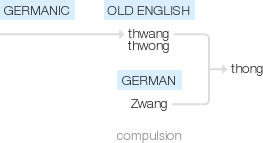Thong
Old English thwang, thwong, of Germanic origin; related to German Zwang ‘compulsion’. Compare with whang.
wiktionary
From Middle English thong, thwong, thwang, from Old English þwong, þwang, þweng, þwæng(“thong, band, strap, cord, strip of leather; phylactery”), from Proto-West Germanic *þwangi, from Proto-Germanic *þwangiz, *þwanguz(“coercion, constraint, band, clamp, strap”), from Proto-Indo-European *twenk-(“to squeeze, press, pressure”).
Cognate with Scots thwang, thwayng, thang(“thong”), Middle Low German dwenge(“clamp, jaws, steel-trap”), German Zwinge(“vise, clamp”), dialectal Norwegian tveng(“shoestrap, shoelace”), Icelandic þvengur(“strap, thong, latchet”).
etymonline
thong (n.)
Old English þwong, þwang "narrow strip of leather" (used as a cord, band, strip, etc.), from Proto-Germanic *thwang- (source also of Old Norse þvengr), from PIE root *twengh- "to press in on, to restrain" (source also of Old English twengan "to pinch, squeeze"). As a kind of sandal, first attested 1965; as a kind of bikini briefs, 1990.
